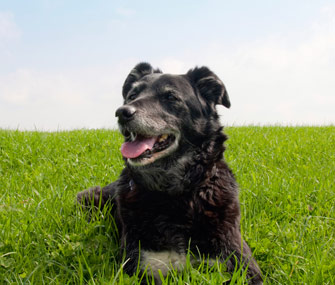Help Keep Your Senior Dog Mentally and Physically Sharp
Published on September 22, 2014
Skip To

As dogs age, both their mental and physical health are affected, and it is important for pet owners to know how to handle these changes.
Changes in Behavior
As your dog gets older, his behavior may change. These changes can be as minor as a decreased desire to play, or they may be more dramatic, such as increased anxiety about unfamiliar noises or a sudden fear of being left alone. Behavioral changes never happen in a vacuum; they are always a response to something your dog has encountered or experienced. Some signs of illness can be misinterpreted as age-related behavioral changes, so contact your veterinarian first if you notice any behavior changes in your pet.Changes in your dog’s behavior may be caused by previous learning and experience, or they may be related to changes in his physical or mental health. In many cases, changes result from a combination of factors. Because of this, any noticeable shift in a canine’s behavior requires help from a professional. Once possible medical issues have been ruled out, your veterinarian may be able to further help with your pet’s behavior problems or recommend a trainer or behaviorist; these specialists can work as a team to address your pet’s difficulties.
Changes in Mental Health
A second major area that may be affected as a dog ages is his mental health. Your dog’s brain is always changing, and it needs constant exercise to stay healthy. Simple measures, such as providing consistent physical activity and mental challenges, and encouraging positive interactions with people and other dogs, can boost your dog’s mental health. These healthy lifestyle habits are an important part of your dog’s daily routine.Not all dogs get as much physical and mental activity as they need to be fulfilled in both mind and body. The combination of a lack of training and an excess of physical and mental energy can result in behavior problems. For example, a dog who doesn’t get enough exercise might expend his excess energy destroying your couch.
Your senior canine is probably less energetic than his younger counterparts, and he may appear to need less mental and physical stimulation, but when a senior dog is not challenged physically and mentally, his brain and overall behavior can suffer.
Teach Your Old Dog Some New Tricks
The adage “You can’t teach an old dog new tricks” is false; many senior dogs are capable of and enjoy learning new things. But there is an underlying truth to the saying: The longer a behavior issue persists, the more established and harder to change it becomes, particularly in an older dog.Behavior issues in senior dogs may escalate because the emotional reactions that cause the problem behavior — for example, barrier frustration or fear of a specific stimulus — can become stronger with continued exposure. As your dog is exposed to a problematic situation or experience, the resulting emotions, especially strong emotions like panic, create new neural pathways that elicit intensified and more immediate reactions.
Issues such as separation anxiety are more easily addressed in young dogs, when the brain is more malleable and the emotional response and habit of reacting is less intense. However, many pet owners don’t seek help until a problem behavior has been ongoing or escalating for years. Fortunately, though it can be a challenge, an older dog can still learn new ways of responding to stressful stimuli.
Some Changes Are More Serious
Sudden and dramatic changes to your senior dog’s behavior may be unrelated to training or socialization; instead, they can be caused by a condition called cognitive dysfunction syndrome (CDS) that affects the brain and behavior of senior dogs. The condition causes behaviors similar to those seen in humans with Alzheimer’s disease. Dogs with CDS may display behaviors like changed sleep and waking cycles, disorientation, potty training mishaps, anxiousness, confusion and decreased appetite or desire to play or interact. These age-related changes to the brain affect about 50 percent of senior dogs to varying degrees, and they are yet another reason to monitor behavioral health under the guidance of a professional.It’s important for dogs in their senior years to have regular veterinary visits to check for mental and physical health issues. Keep in mind that physical issues such as Cushing’s disease and joint disease (like arthritis) can cause changes in behavior, such as unwanted elimination in the home, so it is important to monitor all changes with your veterinarian’s guidance.





